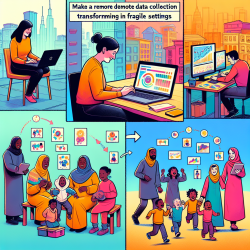Introduction
In the rapidly evolving field of speech-language pathology, data-driven decisions are paramount, especially when it comes to improving outcomes for children. In fragile and humanitarian settings, where traditional data collection methods can be challenging, remote data collection (RDC) tools offer a promising alternative. The recent systematic review titled Methodological and Ethical Implications of Using Remote Data Collection Tools to Measure Sexual and Reproductive Health and Gender-Based Violence Outcomes among Women and Girls in Humanitarian and Fragile Settings sheds light on the potential of RDC in these contexts. This blog explores how speech-language pathologists can leverage these insights to enhance their practice and drive better outcomes for children.
Understanding Remote Data Collection
Remote data collection involves gathering information using digital tools such as phone interviews, online surveys, and mobile applications. In the context of speech-language pathology, these tools can be adapted to collect data on children's communication skills, language development, and other relevant outcomes. The systematic review highlights the methodological rigor and ethical considerations necessary for effective RDC, providing a roadmap for practitioners seeking to implement these tools.
Key Methodological Insights
The review identifies several methodological challenges and best practices associated with RDC. For speech-language pathologists, these insights are invaluable:
- Sampling and Representation: Non-probability sampling methods, often used in RDC, may introduce biases. Practitioners should strive to define clear sampling frames and consider using geo-located data or existing service users to enhance representativeness.
- Response Rates: High non-response and attrition rates can skew data. Implementing strategies such as immediate follow-ups and offering multiple response modalities can improve retention.
- Measurement Tools: Utilizing validated and reliable tools adapted for RDC is crucial. Shortened versions of instruments, tested for psychometric properties, can ensure accurate data collection.
Ethical Considerations
Ethical research practices are essential, particularly when working with vulnerable populations in fragile settings. The review emphasizes the importance of:
- Informed Consent: Ensuring participants understand the research and its implications is critical. Providing clear, accessible information about data security and privacy is also vital.
- Referral Services: Offering participants access to referral services for psychological support or other needs is a best practice that should not be overlooked.
- Inclusivity: Addressing barriers such as literacy and the gender digital divide is essential to foster an inclusive research environment.
Implementing RDC in Speech-Language Pathology
For speech-language pathologists, the insights from this review can guide the implementation of RDC tools to improve child outcomes. Here are some practical steps:
- Adopt Best Practices: Incorporate validated tools and ensure ethical standards are met. This includes obtaining informed consent and providing referral services.
- Customize Tools: Adapt RDC tools to collect relevant data on communication and language development. Consider using mobile applications or online platforms that are accessible to caregivers and educators.
- Engage Stakeholders: Collaborate with local communities, caregivers, and educators to ensure the tools are culturally appropriate and address the specific needs of the population.
Conclusion
Remote data collection offers a powerful means to gather data in challenging settings, ultimately enhancing the ability of speech-language pathologists to improve outcomes for children. By understanding and implementing the methodological and ethical considerations highlighted in the systematic review, practitioners can harness the potential of RDC to make informed, data-driven decisions. For those interested in delving deeper into the research, the original paper provides a comprehensive exploration of these issues. To read the original research paper, please follow this link: Methodological and Ethical Implications of Using Remote Data Collection Tools to Measure Sexual and Reproductive Health and Gender-Based Violence Outcomes among Women and Girls in Humanitarian and Fragile Settings.










